第24届韩素英翻译大赛译文
第二十四届韩素音青年翻译奖竞赛译文5
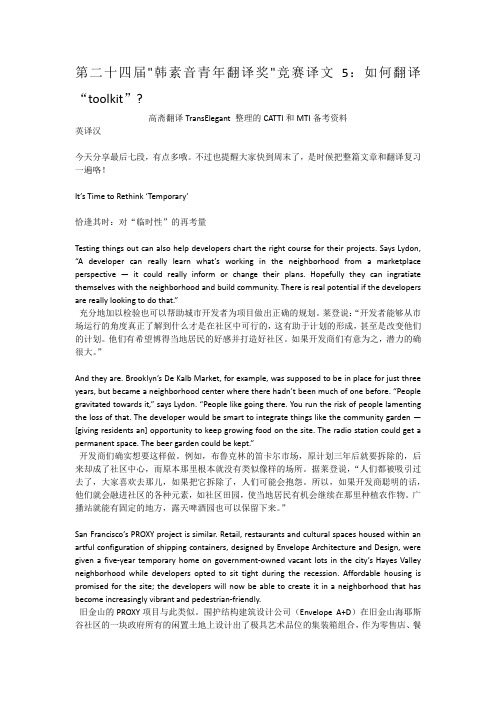
第二十四届"韩素音青年翻译奖"竞赛译文5:如何翻译“toolkit”?高斋翻译TransElegant整理的CATTI和MTI备考资料英译汉今天分享最后七段,有点多哦。
不过也提醒大家快到周末了,是时候把整篇文章和翻译复习一遍咯!It’s Time to Rethink ‘Temporary’恰逢其时:对“临时性”的再考量Testing things out can also help developers chart the right course for their projects. Says Lydon, “A developer can really learn what’s working in the neighborhood from a marketplace perspective —it could really inform or change their plans. Hopefully they can ingratiate themselves with the neighborhood and build community. There is real potential if the developers are really looking to do that.”充分地加以检验也可以帮助城市开发者为项目做出正确的规划。
莱登说:“开发者能够从市场运行的角度真正了解到什么才是在社区中可行的,这有助于计划的形成,甚至是改变他们的计划。
他们有希望博得当地居民的好感并打造好社区。
如果开发商们有意为之,潜力的确很大。
”And they are. Brooklyn’s De Kalb Market, for example, was supposed to be in place for just three years, but became a neighborhood center where there hadn’t been much of one before. “People gravitated towards it,” says Lydon. “People like goi ng there. You run the risk of people lamenting the loss of that. The developer would be smart to integrate things like the community garden —[giving residents an] opportunity to keep growing food on the site. The radio station could get a permanent space. The beer garden could be kept.”开发商们确实想要这样做。
韩素音青翻译奖赛中文原文及参考译文和解析
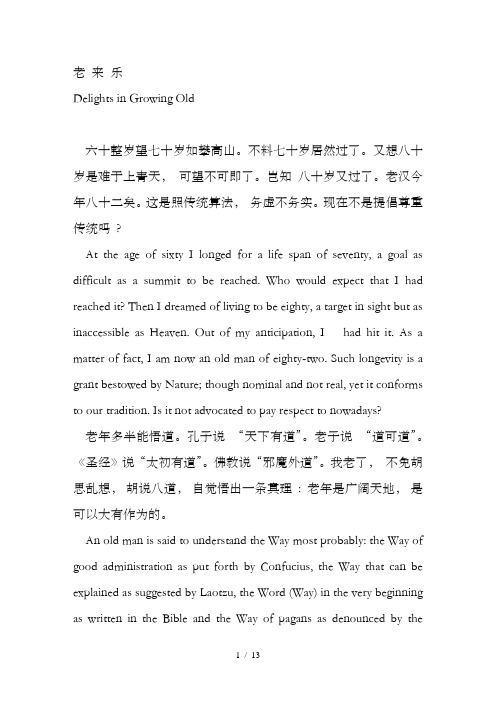
老来乐Delights in Growing Old六十整岁望七十岁如攀高山。
不料七十岁居然过了。
又想八十岁是难于上青天,可望不可即了。
岂知八十岁又过了。
老汉今年八十二矣。
这是照传统算法,务虚不务实。
现在不是提倡尊重传统吗?At the age of sixty I longed for a life span of seventy, a goal as difficult as a summit to be reached. Who would expect that I had reached it? Then I dreamed of living to be eighty, a target in sight but as inaccessible as Heaven. Out of my anticipation, I had hit it. As a matter of fact, I am now an old man of eighty-two. Such longevity is a grant bestowed by Nature; though nominal and not real, yet it conforms to our tradition. Is it not advocated to pay respect to nowadays?老年多半能悟道。
孔子说“天下有道”。
老子说“道可道”。
《圣经》说“太初有道”。
佛教说“邪魔外道”。
我老了,不免胡思乱想,胡说八道,自觉悟出一条真理: 老年是广阔天地,是可以大有作为的。
An old man is said to understand the Way most probably: the Way of good administration as put forth by Confucius, the Way that can be explained as suggested by Laotzu, the Word (Way) in the very beginning as written in the Bible and the Way of pagans as denounced by theBuddhists. As I am growing old, I can't help being given to flights of fancy and having my own Way of creating stories. However I have come to realize the truth: my old age serves as a vast world in which I can still have my talents employed fully and developed completely.七十岁开始可以诸事不做而拿退休金,不愁没有一碗饭吃,自由自在,自得其乐。
第二十四届韩素音青年翻译奖竞赛参赛规则及原文

中国译协《中国翻译》编辑部与江苏人文环境艺术设计研究院(中国译协江苏培训中心)联合举办第二十四届韩素音青年翻译奖竞赛。
具体参赛规则如下:一、本届竞赛分别设立英译汉和汉译英两个奖项,参赛者可任选一项或同时参加两项竞赛。
二、《中国翻译》2012年第1期以及中国译协网()韩素音青年翻译奖专栏刊登竞赛规则、竞赛原文;参赛报名表请到中国翻译协会网站韩素音青年翻译奖专栏下载。
三、参赛者年龄:45岁以下(1967年1月1日后出生)。
四、参赛译文须独立完成,杜绝抄袭现象,一经发现,将取消参赛资格。
请参赛者在大赛截稿之日前妥善保存参赛译文,请勿在书报刊、网络等任何媒体公布自己的参赛译文,否则将被取消参赛资格并承担由此造成的一切后果。
五、参赛译文和参赛报名表格式要求:参赛译文应为WORD电子文档,中文宋体、英文Times New Roman字体,全文小四号字,1.5倍行距,文档命名格式为“XXX(姓名)英译汉”或“XXX(姓名)汉译英”。
参赛报名表文档命名格式为“XXX(姓名)英译汉参赛报名表”或“XXX(姓名)汉译英参赛报名表”。
译文正文内请勿书写译者姓名、地址等任何个人信息,否则将被视为无效译文。
每项参赛译文一稿有效,恕不接收修改稿。
六、参赛方式及截稿日期:请参赛者于2012年5月31日(含)前将参赛译文及参赛报名表以电子文档附件形式发送至hansuyin2012@,发送成功的文档得到自动回复后,请勿重复发送。
如需查询是否发送成功,可在6月10日至7月10日之间拨打电话(010)68997177。
本届竞赛不再接收打印稿。
七、参赛者在提交参赛译文后,交寄报名费50元,如同时参加两项竞赛,请交报名费 100元。
汇款地址:北京市阜外百万庄大街24号《中国翻译》编辑部,收款人:《中国翻译》编辑部,邮编:100037。
请在汇款单附言上注明“XXX(姓名)参赛报名费”字样。
未交报名费的参赛译文无效。
八、本届竞赛设一、二、三等奖和优秀奖若干名,一、二、三等奖获得者将被授予奖金、奖杯、证书和纪念品,优秀奖获得者将被授予证书和纪念品。
韩素英翻译

论怒气在别人看来,怒气是由于各种鸡毛蒜皮的小事而导致的情绪。
当你的爱人问你工作进展如何时,你生气是因为他问问题的这种方法让你感到十分不爽。
晚餐前,另一半正在摆放碗筷,可你不止一次地提醒过他叉子应该放在左边,而非右边,于是他一声长叹,把桌上所有的碗筷全部扫落在地并吼道:“你他妈做得好你来做!”这些无关紧要的小事本身并没有错,但脾气就这样莫名的爆发了。
由于身边有太多的怒火从而使夫妻生活付出很大的代价,所以我们有必要对其进行探究,看看易怒之人到底发生了什么,他们为什么会这样情绪失控。
事实上,我们应该给他们机会让他们搞清楚为什么这些事情不能小事化了,而不是因为琐事而责备他们的小肚鸡肠。
解决问题的办法就是意识到担心彼此的感受在夫妻争吵中产生的作用,而在大多数脾气爆发的背后往往是由于一方常常指手画脚的告诉另一方要做什么。
有些事情我们必须要指出来:我们看到对方的缺点,我们对对方持有评价,但我们表达的方式太过慌乱和急躁。
我们口不择言,言语刻薄,在提建议时没有谨言慎行,当我们的爱人受到这种恼人的“教育”时,他当然会迅速产生抵触心理并反感这些建议,因为这个建议听起来更像是对他们本性的吹毛求疵和无理的攻击,而不是充满关怀且温柔的指出双方共同生活方面的问题。
一个老师要保持心平气和的前提条件是对课程成功与否的在乎程度。
每个人都想把每件事做好,但是如果一个资质不聪明的学生挂掉他的几何学,那么基本上就是他自己的问题。
脾气是可以抑制的,因为个别学生还不足以影响到老师的生活。
然而,不是特别在乎学生成绩的老师反而成为成功教育学的模范。
但是面对一个易害怕、易发怒的爱人是无法选择的。
他不可避免地以一种极端或急躁的方式(如摔门而出)传递给他另一半所谓的“建议”。
这并不是因为他精神失常或是言辞恶毒(虽然很容易让人得出这样的结论),而是因为他十分担心,担心破坏这么多年来与之相处的人的感情,因为这个人已经不可理喻到在沟通、吃饭、出行等方面都要吵架的程度。
韩素音英语竞赛24-27届原文
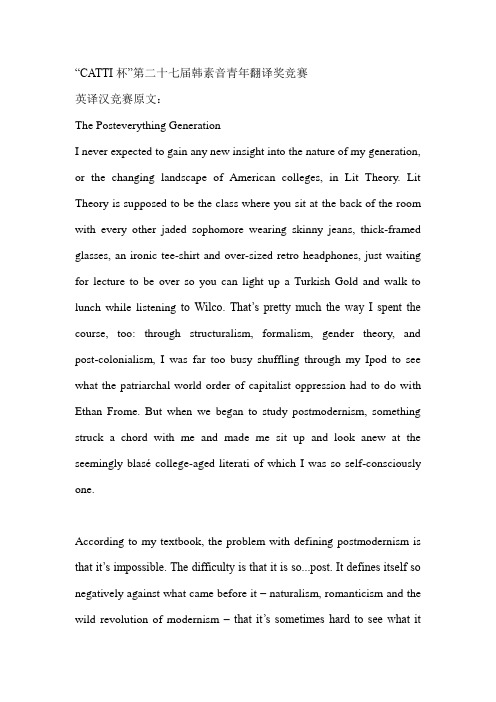
―CATTI杯‖第二十七届韩素音青年翻译奖竞赛英译汉竞赛原文:The Posteverything GenerationI never expected to gain any new insight into the nature of my generation, or the changing landscape of American colleges, in Lit Theory. Lit Theory is supposed to be the class where you sit at the back of the room with every other jaded sophomore wearing skinny jeans, thick-framed glasses, an ironic tee-shirt and over-sized retro headphones, just waiting for lecture to be over so you can light up a Turkish Gold and walk to lunch while listening to Wilco. That‘s pretty much the way I spent the course, too: through structuralism, formalism, gender theory, and post-colonialism, I was far too busy shuffling through my Ipod to see what the patriarchal world order of capitalist oppression had to do with Ethan Frome. But when we began to study postmodernism, something struck a chord with me and made me sit up and look anew at the seemingly blasé college-aged literati of which I was so self-consciously one.According to my textbook, the problem with defining postmodernism is that it‘s impossible. The difficulty is that it is so...post. It defines itself so negatively against what came before it – naturalism, romanticism and the wild revolution of modernism –that it‘s sometimes hard to see what itactually is. It denies that anything can be explained neatly or even at all. It is parodic, detached, strange, and sometimes menacing to traditionalists who do not understand it. Although it arose in the post-war west (the term was coined in 1949), the generation that has witnessed its ascendance has yet to come up with an explanation of what postmodern attitudes mean for the future of culture or society. The subject intrigued me because, in a class otherwise consumed by dead-letter theories, postmodernism remained an open book, tempting to the young and curious. But it also intrigued me because the question of what postmodernism –what a movement so post-everything, so reticent to define itself – is spoke to a larger question about the political and popular culture of today, of the other jaded sophomores sitting around me who had grown up in a postmodern world.In many ways, as a college-aged generation, we are also extremely post: post-Cold War, post-industrial, post-baby boom, post-9/11...at one point in his fa mous essay, ―Postmodernism, or the Cultural Logic of Late Capitalism,‖ literary critic Frederic Jameson even calls us ―post-literate.‖ We are a generation that is riding on the tail-end of a century of war and revolution that toppled civilizations, overturned repressive social orders, and left us with more privilege and opportunity than any other society in history. Ours could be an era to accomplish anything.And yet do we take to the streets and the airwaves and say ―here we are, and this is what we dema nd‖? Do we plant our flag of youthful rebellion on the mall in Washington and say ―we are not leaving until we see change! Our eyes have been opened by our education and our conception of what is possible has been expanded by our privilege and we demand a better world because it is our right‖? It would seem we do the opposite. We go to war without so much as questioning the rationale, we sign away our civil liberties, we say nothing when the Supreme Court uses Brown v. Board of Education to outlaw segregation, and we sit back to watch the carnage on the evening news.On campus, we sign petitions, join organizations, put our names on mailing lists, make small-money contributions, volunteer a spare hour to tutor, and sport an entire wardrobe‘s worth of Live S trong bracelets advertising our moderately priced opposition to everything from breast cancer to global warming. But what do we really stand for? Like a true postmodern generation we refuse to weave together an overarching narrative to our own political consciousness, to present a cast of inspirational or revolutionary characters on our public stage, or to define a specific philosophy. We are a story seemingly without direction or theme, structure or meaning –a generation defined negatively againstwhat ca me before us. When Al Gore once said ―It‘s the combination of narcissism and nihilism that really defines postmodernism,‖ he might as well have been echoing his entire generation‘s critique of our own. We are a generation for whom even revolution seems trite, and therefore as fair a target for blind imitation as anything else. We are the generation of the Che Geuvera tee-shirt.Jameson calls it ―Pastiche‖ –―the wearing of a linguistic mask, speech in a dead language.‖ In literature, this means an author s peaking in a style that is not his own – borrowing a voice and continuing to use it until the words lose all meaning and the chaos that is real life sets in. It is an imitation of an imitation, something that has been re-envisioned so many times the original model is no longer relevant or recognizable. It is mass-produced individualism, anticipated revolution. It is why postmodernism lacks cohesion, why it seems to lack purpose or direction. For us, the post-everything generation, pastiche is the use and reuse of the old clichés of social change and moral outrage – a perfunctory rebelliousness that has culminated in the age of rapidly multiplying non-profits and relief funds. We live our lives in masks and speak our minds in a dead language – the language of a society that expects us to agitate because that‘s what young people do. But how do we rebel against a generation that is expecting, anticipating, nostalgic for revolution?How do we rebel against parents that sometimes seem to want revolution more than we do? We don‘t. We rebel by not rebelling. We wear the defunct masks of protest and moral outrage, but the real energy in campus activism is on the internet, with websites like . It is in the rapidly developing ability to communicate ideas and frustration in chatrooms instead of on the streets, and channel them into nationwide projects striving earnestly for moderate and peaceful change: we are the generation of Students Taking Action Now Darfur; we are the Rock the V ote generation; the generation of letter-writing campaigns and public interest lobbies; the alternative energy generation.College as America once knew it –as an incubator of radical social change –is coming to an end. To our generation the word ―radicalism‖ evokes images of al Qa eda, not the Weathermen. ―Campus takeover‖ sounds more like Virginia Tech in 2007 than Columbia University in 1968. Such phrases are a dead language to us. They are vocabulary from another era that does not reflect the realities of today. However, the technological revolution, the revolution, the revolution of the organization kid, is just as real and just as profound as the revolution of the 1960‘s – it is just not as visible. It is a work in progress, but it is there. Perhaps when our parents finally stop pointing out the things that we arenot, the stories that we do not write, they will see the threads of our narrative begin to come together; they will see that behind our pastiche, the post generation speaks in a language that does make sense. We are writing a revolution. We are just putting it in our own words.汉译英竞赛原文:保护古村落就是保护―根性文化‖传统村落是指拥有物质形态和非物质形态文化遗产,具有较高的历史、文化、科学、艺术、社会、经济价值的村落。
韩素英翻译大赛原文
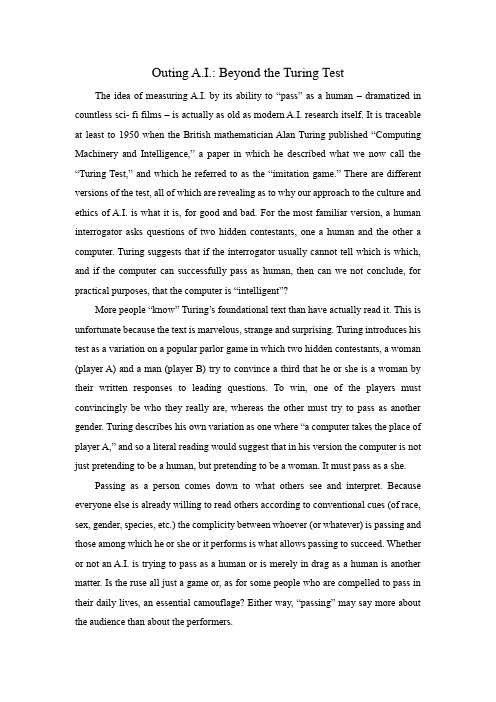
Outing A.I.: Beyond the Turing TestThe idea of measuring A.I. by its ability to “pass” as a human – dramatized in countless sci- fi films – is actually as old as modern A.I. research itself. It is traceable at least to 1950 when the British mathematician Alan Turing published “Computing Machinery and Intelligence,” a paper in which he described what we now call the “Turing Test,” and which he referred to as the “imitation game.” There are different versions of the test, all of which are revealing as to why our approach to the culture and ethics of A.I. is what it is, for good and bad. For the most familiar version, a human interrogator asks questions of two hidden contestants, one a human and the other a computer. Turing suggests that if the interrogator usually cannot tell which is which, and if the computer can successfully pass as human, then can we not conclude, for practical purposes, that the computer is “intelligent”?More people “know” Turing’s foundational text than have actually read it. This is unfortunate because the text is marvelous, strange and surprising. Turing introduces his test as a variation on a popular parlor game in which two hidden contestants, a woman (player A) and a man (player B) try to convince a third that he or she is a woman by their written responses to leading questions. To win, one of the players must convincingly be who they really are, whereas the other must try to pass as another gender. Turing describes his own variation as one where “a computer takes the place of player A,” and so a literal reading would suggest that in his version the computer is not just pretending to be a human, but pretending to be a woman. It must pass as a she.Passing as a person comes down to what others see and interpret. Because everyone else is already willing to read others according to conventional cues (of race, sex, gender, species, etc.) the complicity between whoever (or whatever) is passing and those among which he or she or it performs is what allows passing to succeed. Whether or not an A.I. is trying to pass as a human or is merely in drag as a human is another matter. Is the ruse all just a game or, as for some people who are compelled to pass in their daily lives, an essential camouflage? Either way, “passing” may say more about the audience than about the performers.That we would wish to define the very existence of A.I. in relation to its ability to mimic how humans think that humans think will be looked back upon as a weird sort of speciesism. The legacy of that conceit helped to steer some older A.I. research down disappointingly fruitless paths, hoping to recreate human minds from available parts. It just doesn’t work that way. Contemporary A.I. research suggests instead that the threshold by which any particular arrangement of matter can be said to be “intelligent” doesn’t have much to do with how it reflects humanness back at us. As Stuart Russell and Peter Norvig (now director of research at Google) suggest in their essential A.I. textbook, biomorphic imitation is not how we design complex technology. Airplanes don’t fly like birds fly, and we certainly don’t try to trick birds into thinking that airplanes are birds in order to test whether those planes “really” are flying machines. Why do it for A.I. then? Today’s serious A.I. research does not focus on the Turing Test as an objective criterion of success, and yet in our popular culture of A.I., the test’s anthropocentrism holds such durable conceptual importance. Like the animals who talk like teenagers in a Disney movie, other minds are conceivable mostly by way of puerile ventriloquism.Where is the real injury in this? If we want everyday A.I. to be congenial in a humane sort of way, so what? The answer is that we have much to gain from a more sincere and disenchanted relationship to synthetic intelligences, and much to lose by keeping illusions on life support. Some philosophers write about the possible ethical “rights” of A.I. as sentient entities, but that’s not my point here. Rather, the truer perspective is also the better one for us as thinking technical creatures.Musk, Gates and Hawking made headlines by speaking to the dangers that A.I. may pose. Their points are important, but I fear were largely misunderstood by many readers. Relying on efforts to program A.I. not to “harm humans” (inspired by Isaac Asimov’s “three laws” of robotics from 1942) makes sense only when an A.I. knows what humans are and what harming them might mean. There are many ways that an A.I. might harm us that have nothing to do with its malevolence toward us, and chief among these is exactly following our well-meaning instructions to an idiotic and catastrophic extreme. Instead of mechanical failure or a transgression of moral code, the A.I. maypose an existential risk because it is both powerfully intelligent and disinterested in humans. To the extent that we recognize A.I. by its anthropomorphic qualities, or presume its preoccupation with us, we are vulnerable to those eventualities.Whether or not “hard A.I.” ever appears, the harm is also in the loss of all that we prevent ourselves from discovering and understanding when we insist on protecting beliefs we know to be false. In the 1950 essay, Turing offers several rebuttals to his speculative A.I., including a striking comparison with earlier objections to Copernican astronomy. Copernican traumas that abolish the false centrality and absolute specialness of human thought and species-being are priceless accomplishments. They allow for human culture based on how the world actually is more than on how it appears to us from our limited vantage point. Turing referred to these as “theological objections,” but one could argue that the anthropomorphic precondition for A.I. is a “pre-Copernican” attitude as well, however secular it may appear. The advent of robust inhuman A.I. may let us achieve another disenchantment, one that should enable a more reality-based understanding of ourselves, our situation, and a fuller and more complex understanding of what “intelligence” is and is not. From there we can hopefully make our world with a greater confidence that our models are good approximations of what’s out there.人工智能:超越图灵实验以人工智能“冒充”人的能力的来衡量人工智能的这个概念---已经被数不清的科幻电影搬上了荧幕---实际上已经和现代人工智能研究一样久远了。
第23届韩素音青年翻译奖竞赛汉译英原文
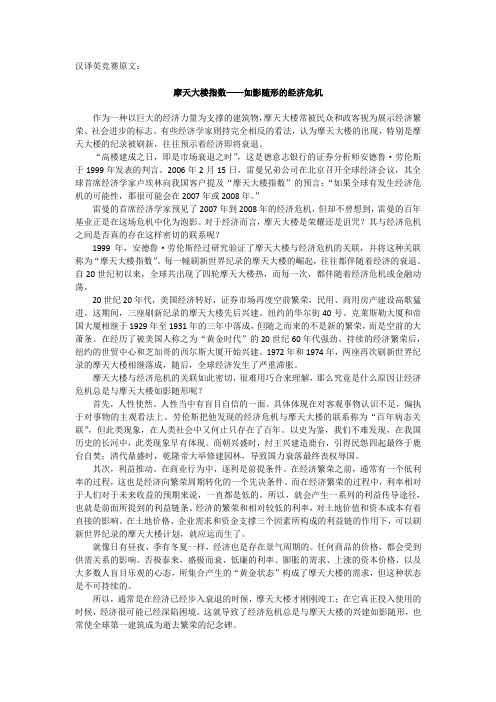
汉译英竞赛原文:摩天大楼指数——如影随形的经济危机作为一种以巨大的经济力量为支撑的建筑物,摩天大楼常被民众和政客视为展示经济繁荣、社会进步的标志。
有些经济学家则持完全相反的看法,认为摩天大楼的出现,特别是摩天大楼的纪录被刷新,往往预示着经济即将衰退。
“高楼建成之日,即是市场衰退之时”,这是德意志银行的证券分析师安德鲁·劳伦斯于1999年发表的判言。
2006年2月15日,雷曼兄弟公司在北京召开全球经济会议,其全球首席经济学家卢埃林向我国客户提及“摩天大楼指数”的预言:“如果全球有发生经济危机的可能性,那很可能会在2007年或2008年。
”雷曼的首席经济学家预见了2007年到2008年的经济危机,但却不曾想到,雷曼的百年基业正是在这场危机中化为泡影。
对于经济而言,摩天大楼是荣耀还是诅咒?其与经济危机之间是否真的存在这样密切的联系呢?1999年,安德鲁·劳伦斯经过研究验证了摩天大楼与经济危机的关联,并将这种关联称为“摩天大楼指数”。
每一幢刷新世界纪录的摩天大楼的崛起,往往都伴随着经济的衰退。
自20世纪初以来,全球共出现了四轮摩天大楼热,而每一次,都伴随着经济危机或金融动荡。
20世纪20年代,美国经济转好,证券市场再度空前繁荣,民用、商用房产建设高歌猛进。
这期间,三座刷新纪录的摩天大楼先后兴建。
纽约的华尔街40号、克莱斯勒大厦和帝国大厦相继于1929年至1931年的三年中落成,但随之而来的不是新的繁荣,而是空前的大萧条。
在经历了被美国人称之为“黄金时代”的20世纪60年代强劲、持续的经济繁荣后,纽约的世贸中心和芝加哥的西尔斯大厦开始兴建。
1972年和1974年,两座再次刷新世界纪录的摩天大楼相继落成,随后,全球经济发生了严重滞胀。
摩天大楼与经济危机的关联如此密切,很难用巧合来理解,那么究竟是什么原因让经济危机总是与摩天大楼如影随形呢?首先,人性使然。
人性当中有盲目自信的一面。
具体体现在对客观事物认识不足,偏执于对事物的主观看法上。
历届韩素音翻译大奖赛竞赛原文及译文
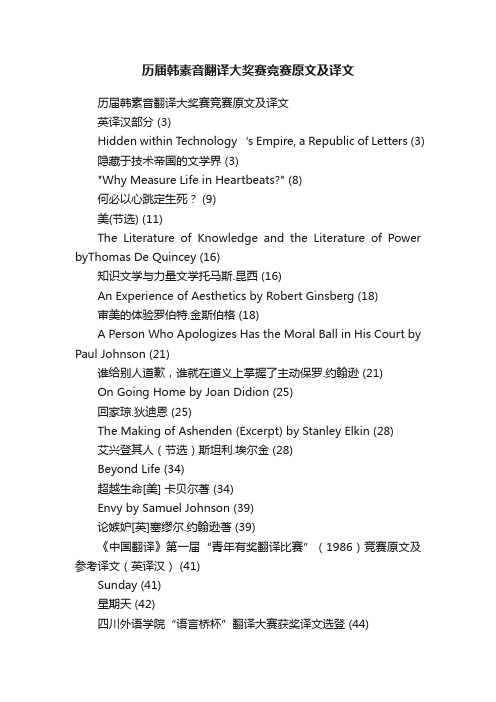
历届韩素音翻译大奖赛竞赛原文及译文历届韩素音翻译大奖赛竞赛原文及译文英译汉部分 (3)Hidden within Technology‘s Empire, a Republic of Letters (3)隐藏于技术帝国的文学界 (3)"Why Measure Life in Heartbeats?" (8)何必以心跳定生死? (9)美(节选) (11)The Literature of Knowledge and the Literature of Power byThomas De Quincey (16)知识文学与力量文学托马斯.昆西 (16)An Experience of Aesthetics by Robert Ginsberg (18)审美的体验罗伯特.金斯伯格 (18)A Person Who Apologizes Has the Moral Ball in His Court by Paul Johnson (21)谁给别人道歉,谁就在道义上掌握了主动保罗.约翰逊 (21)On Going Home by Joan Didion (25)回家琼.狄迪恩 (25)The Making of Ashenden (Excerpt) by Stanley Elkin (28)艾兴登其人(节选)斯坦利.埃尔金 (28)Beyond Life (34)超越生命[美] 卡贝尔著 (34)Envy by Samuel Johnson (39)论嫉妒[英]塞缪尔.约翰逊著 (39)《中国翻译》第一届“青年有奖翻译比赛”(1986)竞赛原文及参考译文(英译汉) (41)Sunday (41)星期天 (42)四川外语学院“语言桥杯”翻译大赛获奖译文选登 (44)第七届“语言桥杯”翻译大赛获奖译文选登 (44)The Woods: A Meditation (Excerpt) (46)林间心语(节选) (47)第六届“语言桥杯”翻译大赛获奖译文选登 (50)第五届“语言桥杯”翻译大赛原文及获奖译文选登 (52)第四届“语言桥杯”翻译大赛原文、参考译文及获奖译文选登 (54) When the Sun Stood Still (54)永恒夏日 (55)CASIO杯翻译竞赛原文及参考译文 (56)第三届竞赛原文及参考译文 (56)Here Is New York (excerpt) (56)这儿是纽约 (58)第四届翻译竞赛原文及参考译文 (61)Reservoir Frogs (Or Places Called Mama's) (61)水库青蛙(又题:妈妈餐馆) (62)中译英部分 (66)蜗居在巷陌的寻常幸福 (66)Simple Happiness of Dwelling in the Back Streets (66)在义与利之外 (69)Beyond Righteousness and Interests (69)读书苦乐杨绛 (72)The Bitter-Sweetness of Reading Yang Jiang (72)想起清华种种王佐良 (74)Reminiscences of Tsinghua Wang Zuoliang (74)歌德之人生启示宗白华 (76)What Goethe's Life Reveals by Zong Baihua (76)怀想那片青草地赵红波 (79)Yearning for That Piece of Green Meadow by Zhao Hongbo (79)可爱的南京 (82)Nanjing the Beloved City (82)霞冰心 (84)The Rosy Cloud byBingxin (84)黎明前的北平 (85)Predawn Peiping (85)老来乐金克木 (86)Delights in Growing Old by Jin Kemu (86)可贵的“他人意识” (89)Calling for an Awareness of Others (89)教孩子相信 (92)To Implant In Our Children‘s Young Hearts An Undying Faith In Humanity (92)心中有爱 (94)Love in Heart (94)英译汉部分Hidden within Technology’s Empire, a Republic of Le tters 隐藏于技术帝国的文学界索尔·贝娄(1)When I was a boy ―discovering literature‖, I used to think how wonderful it would be if every other person on the street were familiar with Proust and Joyce or T. E. Lawrence or Pasternak and Kafka. Later I learned how refractory to high culture the democratic masses were. Lincoln as a young frontiersman read Plutarch, Shakespeare and the Bible. But then he was Lincoln.我还是个“探索文学”的少年时,就经常在想:要是大街上人人都熟悉普鲁斯特和乔伊斯,熟悉T.E.劳伦斯,熟悉帕斯捷尔纳克和卡夫卡,该有多好啊!后来才知道,平民百姓对高雅文化有多排斥。
- 1、下载文档前请自行甄别文档内容的完整性,平台不提供额外的编辑、内容补充、找答案等附加服务。
- 2、"仅部分预览"的文档,不可在线预览部分如存在完整性等问题,可反馈申请退款(可完整预览的文档不适用该条件!)。
- 3、如文档侵犯您的权益,请联系客服反馈,我们会尽快为您处理(人工客服工作时间:9:00-18:30)。
重思建筑暂时性
我们往往认为建筑是永恒的,是对纪念碑地位的渴求。
那种建筑有它的地位, 不同种类的建筑也同样如此。
对于21世纪的头十年大部分时间来说, 建筑是关于大楼的声明。
建筑无论是一个有争议的纪念,还是一个豪华得不可思议的公寓大楼,其存在的原因就是创造一个永久的印象。
建筑一直是永恒的代名词,但事实上它应该是这样的吗?
在过去的几年里,相反的观点可能是真的。
建筑正处于完全的至低点,主要依据稀少而遥不可及。
能引起新闻的建筑是快速而飞逝的的: 弹出式商店,食品车,市场,表演空间。
虽然许多风格的表现形式已经失去了吸引力(如,一个玩具反斗城弹出店),目前有一个不可否认的机会:这是对不断变迁文明的恰当反应。
和许多流行趋势一样----共同消费(又名,“共享”),社区花园,易货贸易-“临时”是如此的复古以至于变得激进了。
在11月,我有幸和利物浦大学的一名研究便携式临时移动建筑的大师-----Robert Brandenburg 见面,他主持了Moonie . Moonie是南加利福尼亚建筑大学的一个专门小组. 作者的一个搁架上放满了关于建筑这个话题的书籍,包括“灵活:架构,响应变化”、“便携式架构:设计和技术”和“房屋的议案:“创世纪”Brandenburg痴迷于此。
也许所有的建筑不应追求永恒的构思,是建筑的一个巨大的转变。
没有负担,建筑师,设计师,建筑商和开发商可以更快地利用当今的技术。
建筑可以重复使用,回收和可持续。
以这种方式转变,它能更好地解决看似不可解决的问题,还成功地创造一种地方感。
在他的报告中,Brandenburg提供了便携式的临时建筑如何应用于人类活动的各个方面的例子,包括卫生保健(从弗洛伦斯·南丁格尔的重新设计的医院,到在甘乃迪政府期间,作为移动医疗诊所的气流拖车),住房(从蒙古包帐篷建筑师坂茂的震后纸屋),文化和商业(布景和伟大的展览建筑,塞纳河边古老的Burinists,移动食品,提供一切的从故事记录到美味的cryème brutes的艺术和音乐场馆。
)
Brandenburg做了一个令人信服的论证,实验所固有的这种结构挑战先入为主的观念,即建筑物可以而且应该是什么。
策略性,他解释说,“适应不可预测的要求,提供更多的不足,并鼓励创新。
”他强调,它的时间为最终用户,设计师,建筑师和建筑公司,制造商重新考虑他们对待临时,便携和移动结构的态度。
这对于建筑是真正的发展和城市规划。
城市建构应该在像丹尼尔伯翰或罗伯特,摩西的大师规划者的桌子上的一起发生,但真的不是像发生在今天的那种方式。
没有一个单一的计划可以预见因为日益多样化的人口或通过短期的,实验的努力可以实现的弹性,反应能力和灵活性的演变和多样化的需求。
这并不是说长期规划没有它的作用。
这两项工作同时并进地开展得很好。
麦克林登,主要的街道计划协会创始人,认为注射自发性纳入城市发展,并认为这些作为短期的行动临时措施(他所称的“战术城市主义”)影响长期的变化。
虽然已经有了巨大的媒体重视快速和廉价的项目如旧金山和纽约的“路面排水沟的咖啡馆,”莱登看到的东西比饲料板块风格大。
“很多事情不仅仅是乐趣和凉爽,”他说。
“这不仅仅是一个自下而上的努力。
这不是自己动手的城市主义。
这是一个被雇用的所有不同的尺度的,连续的想法,技术和战术。
”
“我们看到许多这些事情出现的原因有三个,”莱登继续。
“一,经济。
人们更富有创造性,做事。
二,互联网。
四或五年前,我们无法通过YouTube或脸谱网分享策略和技巧,。
有些事可能会在随即发生,现在我们可以听到它了。
这是在促进这个想法的生长,约克郡和旧金山的双向沿海的竞争说明谁是凉的,更好的东西。
三,人口变化。
城市社区的温和化和改变。
他们把人们寻找改善社区自己。
聪明人每周从事工作40小时。
但他们有足够的闲暇时间来参与建筑,这似乎是一个自然的一步。
”
林登不提倡结束规划但鼓励更多的短期行动,试验,测试(这可以是一个更为令人满意的替代来让项目通过)。
虽然这可能不是直接改变现有的代码或分区的规定,不过没关系,因为,作为弱势的解释,“闪亮的做法采用直接光对旧的思考方式,起作用的老政策.”
建设一个更好的块,很快便从微小的基层集体的一个积极的合作伙伴在城市的事情——已经表明,当暴露你的弱点,改变发生。
如果他们的临时措施违反现有的代码,建立一个更好的块只描绘了一个标志告诉行人的事实。
他们改变了规则,以这种方式。
有时不总是-官僚主义走开,让真正的改变发生。
检测出来的东西也可以帮助开发人员图表正确的项目。
林登说,“一个开发者可以真正了解什么是工作在社区从市场角度-它真的可以通知或改变自己的计划。
希望他们能交心的邻里和社区建设。
有真正的潜力,如果开发商找真的这样做。
”
他们是。
布鲁克迪卡尔布市场,例如,本来应该在的地方只有三岁,但成为一个社区中心,没有太多的人之前。
“人们倾向于它,”莱登。
“人们喜欢去那里。
您运行的风险,人们哀悼失去的。
开发人员会聪明将像花园社区- [给居民]的机会将越来越多的食物的网站。
电台可以得到一个永久性的空间。
啤酒花园可以保存。
”
三藩的代理项目是类似的。
零售,餐饮文化空间设在一个巧妙的结构设计的集装箱,信封架构和设计,给出了一个五年临时的家国有空地在开发商选择坐在衰退。
经适房是承诺的网站;开发者现在可以创建它的附近,已越来越充满活力和步行。
在更大的规模,对于检测的主要发展被测试来说,这些想法的试验和错误中, 虽然等待了很不景气,民间被测试住户和使用在其第五和使命的位置,这是(现在仍然是)在三藩纪事报,现在也有组织的办公空间,艺术馆艺术交叉点,高科技公司广场和一点点食品车喂那些饥饿的,勤劳的租户。
几年前,更有可能抛出了一个办公楼与一些豪华公寓顶上叫它一天:根据一个公司的副总裁,在舞台上,经济衰退花费时间“重新想象地为我们的新兴经济和什么样的环境,有助于促进。
”
在“干涉主义的工具包里,”评论家咪咪格尔写道,对于为自己动手的城市规划专家干预来说,真正的成功不会建立在任何一个项目的基础上,但将会在“我们可以评估建立在推广,经济影响,社区营造,创业,可持续设计的基础上的行动时发生。
但我们现在还没到时候。
”她是对的。
也没有寻找不仅失败并且如此灾有难性的临时项目的例子,(参见:例如,卡特丽娜飓风的拖车)。
战术的都市生活的一个巨大的理论涉及到政治。
作为一个医生说,“我们正在做这些事情来打击政府缓慢发展。
”
但这一切都是超过一个响应机构;在它的最佳状态,这是自由的思维和创造力的一个大胆的表达……并且这些天没有足够的行动。
临时和战术的一个包围的可能不是完美的,但它可能是城市建设中最强大的工具库之一,我们已经有了。
